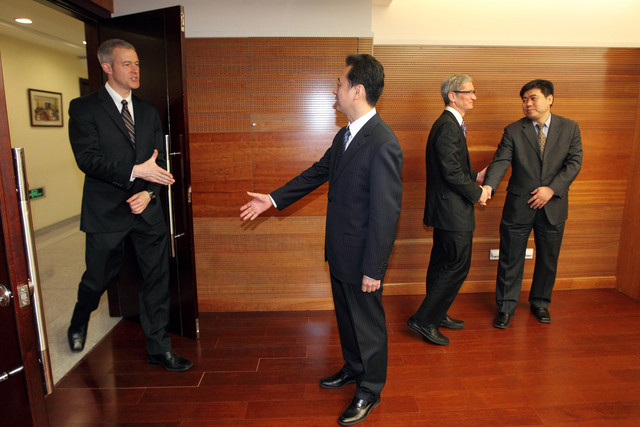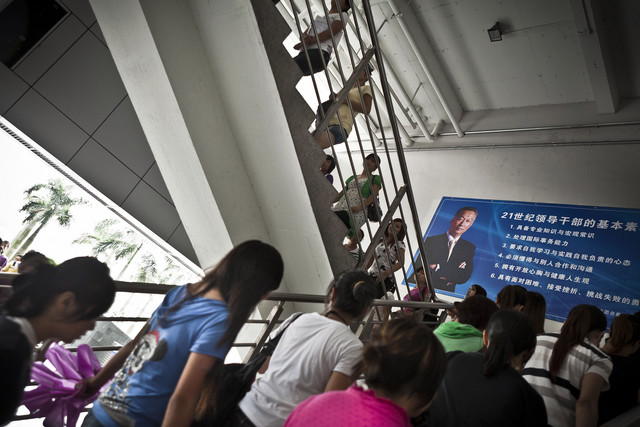Apple Says China Agent Forged Papers for Underage Workers
January 25, 2013
“Underage labor is a subject no company wants to be associated with, so as a result I don’t believe it gets the attention it deserves, and as a result it doesn’t get fixed like it should,” Jeff Williams, Cupertino, California-based Apple’s senior vice president of operations, said in an interview.
|
Apple, which joined the Fair Labor Association last year after being criticized for working conditions at suppliers including Foxconn Technology Group, said it doubled the number of employees trained in worker rights, laws and safety. The designer of iPads and iPhones also said it started doing environmental audits and cooperated with a China group that had criticized its record.
A total of 158 facilities globally lacked proper procedures or didn’t perform adequate audits of their own suppliers, according to the report. Forged Papers The investigation found that Shenzhen Quanshun Human Resources Developing Co., a Shenzhen-based labor broker with an office in Henan, had cooperated with families to forge documents allowing the children to get past age-verification procedures, according to Apple. Shenzhen Quanshun’s manager Wu Yong denied involvement with the manufacturer named in the report. |
|
“We have to deal with so many workers every day, how could we have time to forge verification documents?” he said. The company’s Henan affiliate was de-registered in October, according the to the provisional government’s online registry.
Guangdong Real Faith Pingzhou Electronics Co., which supplied circuit-board components, had its business with Apple terminated after an audit in January last year found underage workers supplied by Shenzhen Quanshun, according to the report. Wan Xiaocheng, deputy general manager at the supplier’s parent Guangdong Real Faith Enterprises Group Co. declined to comment. “Given the high turnover rate in the factories and the production pressure in the peak season, the factories may not strictly comply with labor laws and the code of conduct,” said Debby Chan, a spokeswoman for Hong Kong-based Students and Scholars Against Corporate Misbehavior. |
Apple decided to name the companies to highlight the systemic problem of labor agencies recruiting underage workers, Williams said. The company also is identifying those agents to its suppliers.
“Most companies, they either don’t report on it at all, or they say they look for it and found none, or they obscure the data in some way,” Williams said. “If they’re not finding it, they’re not looking hard enough.”
Apple outlined the findings of 393 audits covering 1.5 million workers in 14 countries. Twenty-eight inspections were surprise visits, it said in the report. The number of inspections in 2012 was up 72 percent from 229 the year before.
The company tracked work hours for 1 million workers, and suppliers boosted the compliance rate for the maximum 60-hour work week to 92 percent from 38 percent in last year’s report. The average work week was less than 50 hours, it said.
Overtime Demand
People falsifying their own documents to gain employment and others seeking excessive overtime hours remain challenges for Foxconn, said Louis Woo, a spokesman for the Taipei-based company. Many employees want to work longer and may leave if they don’t get enough hours, he said.
“If we do not provide sufficient overtime hours, then we become uncompetitive in the marketplace for attracting workers despite the fact that our basic wage is higher,” Woo said.
Apple Chief Executive Officer Tim Cook, who was previously head of operations, helped design the network of suppliers and manufacturers that built the more than 80 million iPhones and 32 million iPads sold in its last fiscal year. The company had profit of almost $42 billion on sales of $156.5 billion last year.
Raw Materials
Apple didn’t disclose information about the source of raw materials for its products. While Apple said it’s taking steps to prevent the use of minerals from “conflict” areas, such as Democratic Republic of Congo, the report doesn’t disclose the sources for any of the four metals tracked by Apple in its supply chain — tin, tungsten, tantalum and gold — nor does it disclose the mines and refineries used by suppliers.
Cook said in an interview with Bloomberg Businessweek in December that “we’re back to the mines. We’re going all the way, not just at the first layer. And in addition to that, we’ve chosen to be incredibly transparent with it.”
Tin is the most widely used metal because it becomes the solder that binds components together in iPads, iPhones and other devices. A Bloomberg Businessweek and Bloomberg News investigation published in August traced solder used by Apple suppliers, including Foxconn Technology Group, and other top electronics manufacturers to Indonesia’s Bangka Island. Tin miners in those areas were found to be buried alive at a rate of almost one a week last year.
To contact the reporters on this story: Tim Culpan in Taipei at tculpan1@bloomberg.net; Adam Satariano in San Francisco at asatariano1@bloomberg.net
To contact the editor responsible for this story: Michael Tighe at mtighe4@bloomberg.net






Leave a Reply
Want to join the discussion?Feel free to contribute!